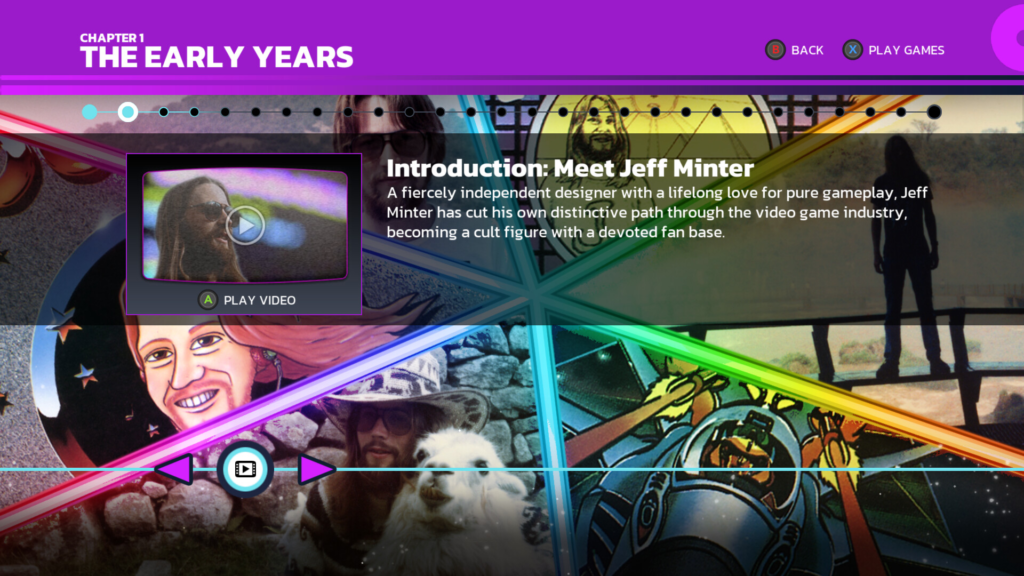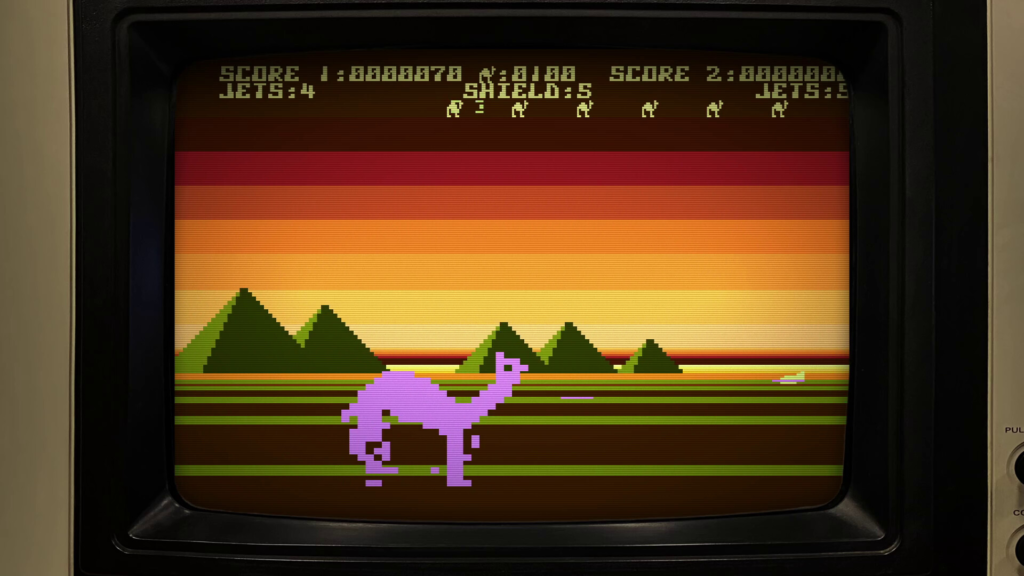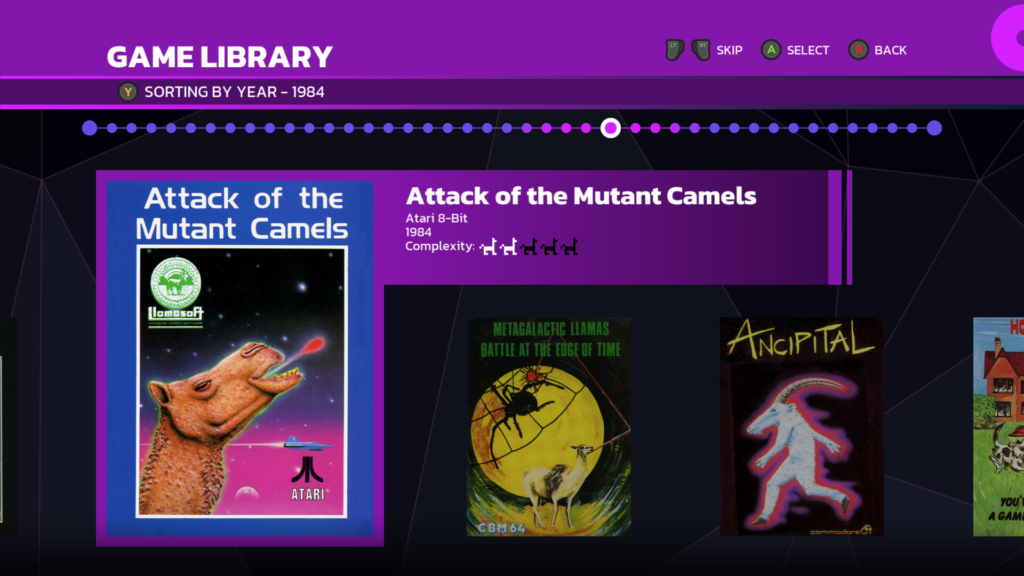At 41 years young, I’m probably considered an old head in the gaming community these days. I wasn’t there right at the start, but I was there when it really started to blossom and, unfortunately, when it crashed. Console gaming wasn’t a thing in our household growing up, as Dad got me started on this long journey with a 48k ZX Spectrum and a stack of pirated tapes. We moved through the generations to a 128k, then the Amiga, PC and finally entered the console world with the release of the PS1 after we rented one from Blockbuster.
The early days still feel fresh in my mind and I enjoyed a wide array of weird and wonderful games. The sounds of those old tape decks is etched in my mind and will likely never leave me. It was a time of experimentation and nobody experimented with this burgeoning new medium more than Jeff Minter. The man has had an undeniable influence on our past time, and his curious mind has delivered some true classics over the last 40 odd years. It’s here, with Llamasoft: The Jeff Minter story, that his legacy is laid bare. Part documentary, part game collection, this new title does its best to preserve a part of history.

By his own admission, some of these games aren’t very good. In fact many of them havent really stood the test of time. But these are pioneering pieces of software that serve as the forebears of what we know and love today. These are things that were thought impossible at the time whether it was due to hardware limitations or, even limitations in the developers own skill set. Despite all of this, these little pieces of history can be a great deal of fun even if only for a few minutes at a time. They also demonstrate exactly how far we have come in a relatively short space of time. People who bang on about lazy developers or poor optimisation would be well served to remember that the hobby really still is in its infancy. No matter how powerful the hardware we currently have is, getting anything to work, and ultimately be fun, is still some kind of witchcraft.
It all starts off with a simple, yet effective timeline, covering various chapters in the life of this off the wall British developer. Sure, you can dive right in and experience the games, but I implore anyone with an interest in the birth of home gaming to take time to go through the documentary experience. The package contains a multitude of videos, short interview pieces, hand written manuals and excerpts of Jeff Minters life. The clips are short, mostly coming on at a few minutes a piece, but they provide a great insight from industry professionals as well as the man himself.

None if it feels self congratulatory, and Jeff comes across as a humble man, going about his business. It’s made abundantly clear throughout that most of what hes made, is what he finds fun. Not only that but we get brief snippets of his younger days. There’s photos of where he grew up, along with the towns history and association with atomic weapons research. We’re told how his interest in coding grew from seeing someone playing a home made game on a Commodore Pet. Hand written manuals for games only ever released in small quantities are accompanied by renderings of original cassettes. It’s all beautifully presented, if somewhat simple.
This was the time of the bedroom coder and things were very experimental. Released in small batches, with hand written labels, it really was the defenition of indie. By oh my, what fun there is to be had! It all kicks off with his first “game” 3D3D – a three dimensional maze set over multiple levels where the only goal is to get out. Its very rudimentary, but for the time, this was cutting edge stuff. There was a centipede clone, a strange puzzle game that used angled paddles that you placed on the screen, City Bomb, which saw you dropping bombs on a city skyline, trying to flatten it. Then we have the better known releases like Tempest and Atrack of the Mutant Camels and its sequel, and one of my personal favourites – Hover Bover.
 In total, there are 43 games here including the various ports. You really couldn’t get away with releaseing most of these ideas these days, because people would scoff at the themes. But this era was the birthplace of gaming and it was a miracle they got half the stuff to even work. Can you imagine releasing a game these days where the aim is to navigate a maze, cutting grass with a lawnmower that you’ve stolen from the neighbour as he chases you? I doubt most AAA devs these days could even come up with something so outlandish!
In total, there are 43 games here including the various ports. You really couldn’t get away with releaseing most of these ideas these days, because people would scoff at the themes. But this era was the birthplace of gaming and it was a miracle they got half the stuff to even work. Can you imagine releasing a game these days where the aim is to navigate a maze, cutting grass with a lawnmower that you’ve stolen from the neighbour as he chases you? I doubt most AAA devs these days could even come up with something so outlandish!
One real benefit of releasing on modern systems is the load times. It gives you a bit of a taste of manually loading by typing instructions, then listening to those old screeching load screens. But its over in a flash. You don’t have to worry about waiting 20 mins, only for it to fail because you let it load for a few seconds too long. Modern audiences will likely be dismayed at the overall presentation of these game. The visuals havent aged very well, lets be honest, but they are full of gameplay. They are generally addictive and improvements can be seen as the years progress but I’d be remiss to say these have stood the test of time. For a nostalgia piece and a preservation piece, its fantastic, but there is no real equivalent to Mario on the NES. I’ve given my 8 year old nephew a go of some of the games and the interest just isn’t there. It’s disappointing but not unexpected. Some of the games feel impenetrable despite the well written instructions, so it goes to show how far we have come with regards to accessibility to the hobby.

I really did enjoy the time I spent with Llamasoft: The Jeff Minter Story. Going back to some of the games from my youth put a massive smile on my face and brought memories flooding back. It is very hard to recommend to anyone but those looking to learn about a bit of gaming history or those who played these games when they first came out. The one thing I will say though, is that my personal opinion of these games hasn’t changed, I still find them entertaining. I also found the documentary style parts to be riveting. Jeff Minter was a pioneer, and has likely inspired many people to become developers. Without people like him going totally off piste with their ideas, I might not have been as interested in this hobby as I am now. This is an unabashed celebration of one of the greats, and I’m glad his legacy is being preserved for future generations even if the audience for these retro explorarions feels like it’s dwindling.
Overall
-
CX Score - 75%75%
Summary
Pros
- Presentation
- The memories
Cons
- Games definitely showing their age
- Some games are overly complex

